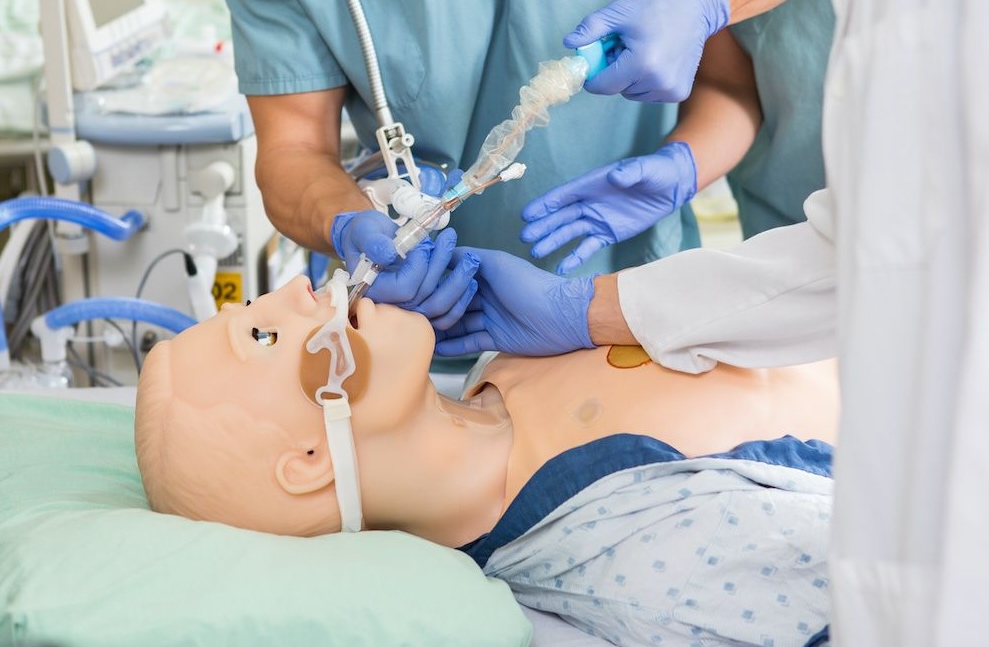TeamSTEPPS, an evidence-based program, is designed to optimize the performance of healthcare teams. Effective teamwork and communication are foundational to providing every patient with high-quality, safe care throughout the healthcare system. Agency for Healthcare Research and Quality (AHRQ), a division of the U.S. Department of Health and Human Services, updated TeamSTEPPS recently to address changes in healthcare delivery and learning methods and to emphasize patient engagement at the center of care with TeamSTEPPS 3.0. Beginning in March 2024, The AHRQ will offer TeamSTEPPS training free of charge in person and virtually. This HealthySimulation.com article by Teresa Gore, PhD, DNP, APRN, FNP-BC, CHSE-A, FSSH, FAAN, will provide an overview of TeamSTEPPS 3.0 with a focus on the frontline provider.
TeamSTEPPS was developed in consultation with experts in teamwork and team training that included patients and family caregivers.TeamSTEPPS is guided by emerging research related to teams, team performance, communication, adult learning, and input from frontline providers in care settings, including hospitals, long-term care facilities, and outpatient practices.
The TeamSTEPPS 3.0 updated curriculum consolidates content from previous versions into a single integrated resource. Participants begin with the welcome guide for their role: frontline providers, trainers of pre-professional students, administrators, patients and family caregivers, new TeamSTEPPS trainers, and experienced trainers. The updated training is delivered using active learning strategies in a modular course design. The updated curriculum reflects five major emphases:
Patient Focus: How to involve patients and family caregivers in care processes and decision-making is an important consideration for patient safety. Patients and family caregivers should be directly involved in care teams’ discussions. Examples, teaching approaches, and other resources in the curriculum are designed to reinforce this focus. The curriculum also considers additional communication and patient engagement methods, such as patient portals, and telehealth tools and technology.
Integrated TeamSTEPPS Platform: TeamSTEPPS 3.0 consolidates content from prior curriculum versions created for separate care settings and incorporates these into a single integrated resource.
Modular Course Design: TeamSTEPPS 3.0 can be taught in sessions of varying lengths. However, extended training can exceed attention spans or take staff away from other responsibilities for too long. A series of shorter training sessions, or even a single shorter training session addressing a specific need, may more effectively meet the needs of both TeamSTEPPS students and their organizations. Shorter sessions may also be easier to facilitate via virtual or hybrid training.
Active Learning Strategies: The use of passive learning methods (e.g., listening to lectures) is less likely to produce sustainable changes in frontline staff attitudes and behaviors compared with active learning strategies, which today’s workforce expects. The curriculum is designed to provide a variety of options for helping people learn or teach TeamSTEPPS 3.0, using discussions, exercises, video-based simulations, and other approaches they can actively engage in.
Emerging Team Challenges and Opportunities: Technology changes such as high-speed internet, instant messaging, and telemedicine are accompanied by an evolution in the workforce, which is more diverse and multi-generational. TeamSTEPPS 3.0 focuses on maximizing patient safety and makes connections between effective teamwork and well-being, job satisfaction, and reduced burnout of frontline care providers. The curriculum highlights how a more diverse workforce can benefit team functioning.
View the LEARN CE/CME Platform Webinar Beyond the Checklist: What Healthcare Simulation Can Learn from Aviation Safety and Teamwork to learn more!
TeamSTEPPS 3.0 for Frontline Provider
TeamSTEPPS 3.0 has specific guides depending on the role in patient care. The roles of the frontline healthcare worker will be explored. As a frontline provider, the effects and occurrence of poor communication and ineffective team leadership are observed in patient safety, organizational efficiency, staff morale, burnout, and turnover. The tools offered in TeamSTEPPS 3.0 will provide resources to help the frontline workers:
- Cope with patient and peer stressors
- Expand communication technologies
- Provide relevant technical assistance for electronic medical records barriers.
- Public health emergencies have affected worker safety, family and other life routines, workplace protocols, and workloads and have contributed to tensions among staff with different life views. TeamSTEPPS 3.0 tools and concepts can help understand and deal with public health emergency risks and how to constructively cope with them
- Help manage challenges arising from rapid changes in teams due to changing job market linked to public health emergencies
- Build levels of trust and mutual respect needed for effective team functioning with more diverse teams to identify the differences, directly acknowledge them, and treated as an asset rather than an inconvenience
- Recognize that the expanded functionalities available in electronic health records can create a risk of over-dependence on technologies to facilitate care coordination at the expense of handoffs and other recommended practices for providing safe care to patients.
TeamSTEPPS Four Modules in Each Specific Guide
Each specific guide is divided into four modules. These modules are Communication, Team Leadership, Situation Monitoring, and Mutual Support. Each module is further divided into three sections: Overview of Key Concepts and Tools, Explanation of Key Concepts and Tools, and Teaching the Key Concepts and Tools. TeamSTEPPS 3.0 provides an Implementation Resources section that includes teaching strategies and implementation processes. The citation for TeamSTEPPS 3.0 is TeamSTEPPS Updates with content last reviewed February 2024 by Agency for Healthcare Research and Quality, Rockville, MD.
Additional TeamSTEPPS 3.0 Online Resources
The TeamSTEPPS website offers many valuable resources. There are opportunities to participate in TeamSTEPPS training free of charge at this time. As clinical simulation professionals, this is an excellent opportunity for professional development to improve simulation practices and patient care. Three videos are available that feature patient and family caregiver stories, access to three TeamSTEPPS simulation training units, and an updated TeamSTEPPS Pocket Guide App. Take advantage of these free TeamSTEPPS training resources to improve the education of learners.









